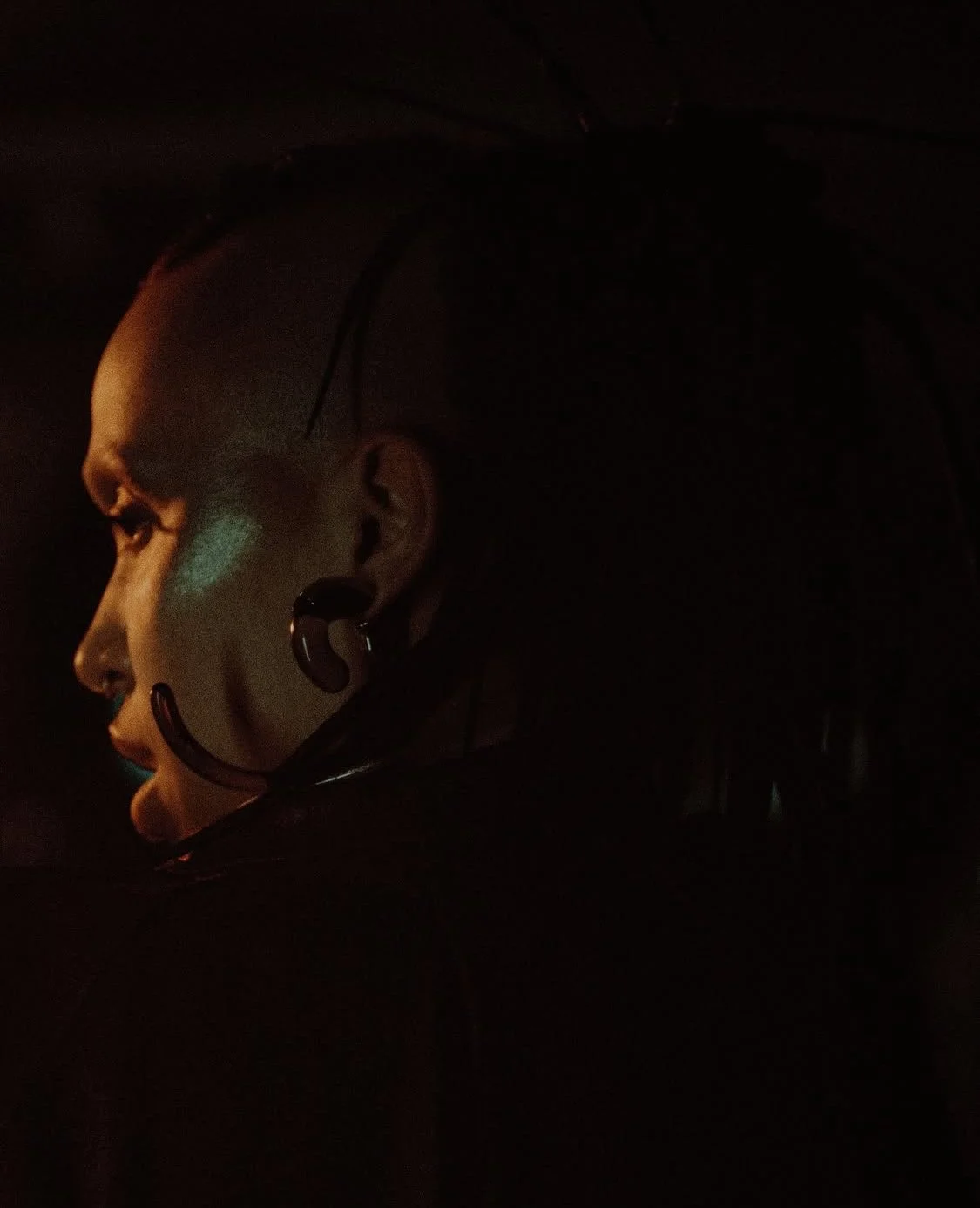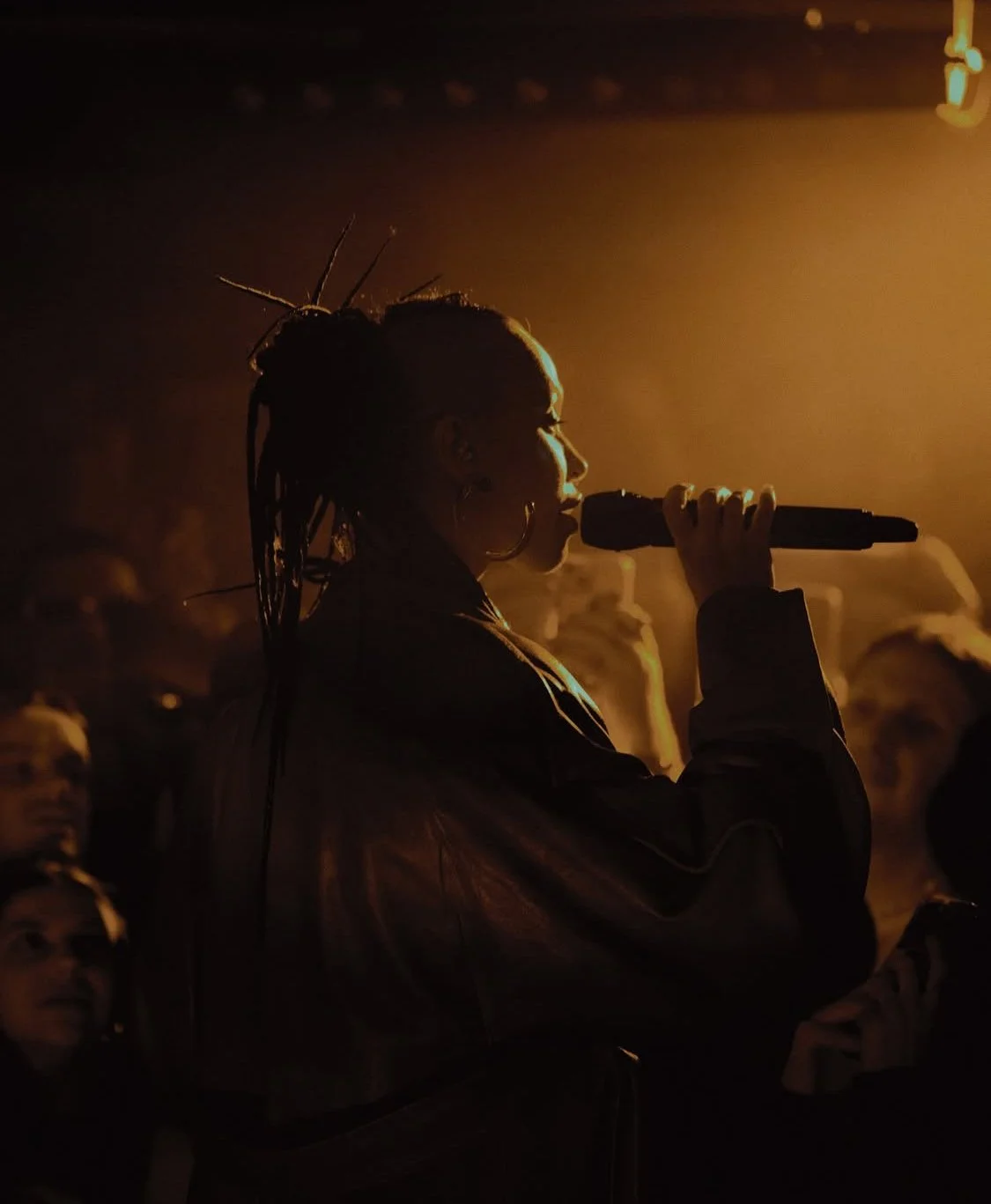FKA Twigs visits Manchester
FKA twigs at High Hoops, Islington Mill
I’ve been standing in a dark basement in Manchester for two hours now. The DJ, softly lit in purple, has been playing a tasteful blend of grown-up techno and house. Fun but minimalist with restrained long blends, fixing people into their own personal rhythms before a curveball releases the room’s dramatically dressed audience into one another. I was enjoying it a lot.
All of a sudden, the music cuts, the lights snap on, and she’s there – for all of twenty minutes.
Like her latest album, FKA Twigs did not stick around. Wham bam, thanks for all the videos, see ya!
Shit.
How am I going to write a gig review about a gig that consisted of four songs? Tricky, so you’re getting the album review instead.
In fact, the night as a whole, upon further reading of the RA listing, was intended to encapsulate the feeling and inspiration of FKA Twigs’ Eusexua rather than be a performance of it. So how did it hold up?
In interviews for the album rollout, Twigs has been quoted that her inspiration for her latest release first came when she moved to Prague to film 2024 horror-lite movie, The Crow. Do you remember that FKA Twigs was in The Crow? Do you remember The Crow? No, neither do I – but nevertheless we have it to thank for Eusexua. She’s stated that the album isn’t strictly a dance album, but that the feeling and aesthetics of dance music are being used to tell her own story. A connection to the club was found in Prague, one that I can absolutely see appealing to Twigs. The feeling of losing oneself that dance music can provide you not just in the music but in the crowd, in the dimly lit corners, the many rooms. For someone who has often spoken about the insecurity that fame has brought, a club could feel like a refuge not just from the world, but from yourself.
Twigs has expended a lot of energy in the press tour for the album explaining her self-coined term Eusexua. Firstly, I love this. More artists should make up words, the sillier and more hyper-specific the better. Eusexua is the concept, as far as I can understand it, of the anticipatory flow state one feels just before the revelation of an act. Writing, cooking, working out, having sex – your consciousness has fallen away and you are purely existing in the moment, building towards your task’s final crescendo. Such efforts to explain the project’s ideas and motivations suggest a grand overarching concept album where she has something she really needs to say, but Eusexua often takes serious divergences from its concept.
It’s something that’s been gnawing at me. What does this album want to be? Is it a dance record? A pop record? A concept album? I mean she came up with a new word for it for Christ’s sake, there has to be something behind that! But travesties like Childlike Things don’t end up on an album totally dedicated to a feeling of flow-state. Just seeing the name North West is enough to completely pull me out of any flow I might have, to go – wait, what the fuck?
FKA twigs at High Hoops, Islington Mill
This album clearly has pop sensibilities and a desire for mass appeal. But they lead to by far the most dull and disappointing moments on the album. Things like a North West cameo to gain social media buzz or the entirety of Perfect Stranger, a boringly familiar dance-pop banger that’s made to sound like a Jamie XX song. While these tiringly trendy elements might provide a rush of blood on initial listen, they’re drained of creativity.
Even the album’s marketing was very much focussed on ‘Euseuxa is the feeling of X while you’re X’. Which, I’m sorry, we just had ‘Kamala is Brat’ – let’s come up with a new way to encapsulate your grand philosophy, yeah? So a lack of clarity on what this album is trying to do is apparent. But that unevenness also works to massive effect sometimes. Cuts like Drums of Death and Keep it, Hold It use driving kick drums or explosions of break-beats as sudden outbursts of emotions, an exorcising of the pressures and anxieties that litter the album’s lyrics, completely changing the feeling and even tempo of the tracks from soft piano chords or choral singing into balls of energetic ecstasy. They’re uneven in the best way, completely taking you off-guard and bringing you back again and again.
And there is a lot that will keep bringing you back. The title track, Eusexua, or Room of Fools as well as Drums and Keep it, could be some of Twigs’ finest work to date. Eusexua, as you might expect for the title track, is all the influences Twigs has discussed distilled into one perfect Twigs Techno TrackTM. Dark, wet and cold with a trickling synth and four to the floor kick drum, Twigs’ luminescent voice floats over the top, filling the song’s corners with steely light.
On Room of Fools she goes full-on Bjork. The high-pitched yelps and voice breaks, the choral chants, it’s all very 90s Big Time Sensuality. The rousing keys breaking into ping-ponging synth lines with Twigs’ vocal experimentations contorting and snapping back.
It’s been stuck in my head for days.
Twigs’ exquisite singing ability and experimentation are as good here as anywhere in her career. In a time where gimmick often feels like it replaces talent, with this record, talent wins. She’s produced music that isn’t club music, but uses its sonic hallmarks to paint a portrait.
Twigs’ lyrics are almost singularly about a feeling of isolation or anonymity. On Sticky, possibly Twigs’ most vulnerable moment on the album, she describes her issues with intimacy:
“I tried to fuck you with the lights on, In the hope you’d think I’m open… I hold it in my body, little snakes inside a bottle”
“My body aches to be known”
Her singing gives way to a more clubby soundscape before collapsing in a swirl of feedback and chopped up vocals. This feeling of club music is an escape for Twigs, where the Eusexian flow state allows you to forget these pressures and concerns and just live instinctively, without thought. Similarly, on 24hr Dog she begs her lover:
“Please don’t call my name, when I submit to you this way”
Eusexua is about slipping away, becoming a nameless, faceless member of the crowd. In this way the club provides her a place to do this, but clubbing is not the objective, the slipping is. It’s why this is not a dance album – it merely uses those aesthetics to remind us of that feeling.
Towards the end of the night that inspired this review, I left its dingy basement and went out for a cigarette. Wandering through the small, cluttered industrial estate it was hidden in, I remember looking at the skyline of a sleeping city and experiencing a sensation of safety. I was an observer, burrowed away in loud music and dark corners. I stood apart from the millions of people and cars and lights. The stressful accoutrement of life was meaningless here.
This, to me, is Eusexua. An ode to the club and its ability – to protect, to absolve, to help us slip away from the world even for a little bit. It’s not a perfect solution to our problems, it’s not a perfect album – but it is powerful.
Written by Joe Hurdman



